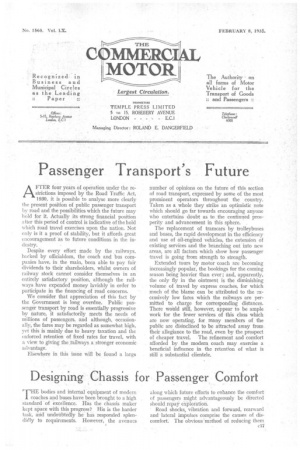Passenger Transport's Future
Page 79

If you've noticed an error in this article please click here to report it so we can fix it.
AFTER four years of operation under the restrictions imposed by the Road Traffic Act, 1930, it is possible to analyse more clearly the present position of public passenger transport by road and the possibilities which the future may hold for it. Actually its strong financial position after this period of control is indicative of the hold which road travel exercises upon the nation. Not only is it a proof of stability, but it affords great encouragement as to future conditions in the industry.
Despite every effort made by the railways, hacked by officialdom, the coach and bus companies have, in the main, been able to pay fair dividends to their shareholders, whilst owners of railway stock cannot consider themselves in an entirely satisfactory position, although the railways have expended money lavishly in order to participate in the financing of road concerns.
We consider that appreciation of this fact by the Government is long overdue. Public passenger transport by road is essentially progressive by nature, it satisfactorily meets the needs of millions of passengers, and although, occasionally, the fares may be regarded as somewhat high, yet this is mainly due to heavy taxation and the enforced retention of fixed rates for travel, with a view, to giving the railways a stronger economic advantage.
Elsewhere in this issue will be found a large number of opinions on the future of this section of road transport, expressed by some of the most prominent operators throughout the country. Taken as a whole they strike an optimistic ,note which should go far towards encouraging anyone who entertains doubt as to the continued prosperity and advancement in this sphere.
The replacement of tramcars by trolleybuses and buses, the rapid development in the efficiency and use of oil-engined vehicles, the extension of existing services and the branching out into new areas, are all factors which show how passenger travel is going from strength to strength.
Extended tours by motor coach are becoming increasingly popular, the bookings for the coming season being heavier than ever ; and, apparently, the only fly in the ointment is the diminishing volume of travel by express coaches, for which much of the blame can be attributed to the excessively low fares which the railways are permitted to charge for corresponding distances. There would still, however, appear to be ample work for the fewer services of this class which are now operating, for many members of the public are disinclined to be attracted away from their allegiance to the road, even by the prospect of cheaper travel. The refinement and comfort afforded by the modern coach may exercise a beneficial influence in the retention of what is still a substantial clientele.














































































































































































